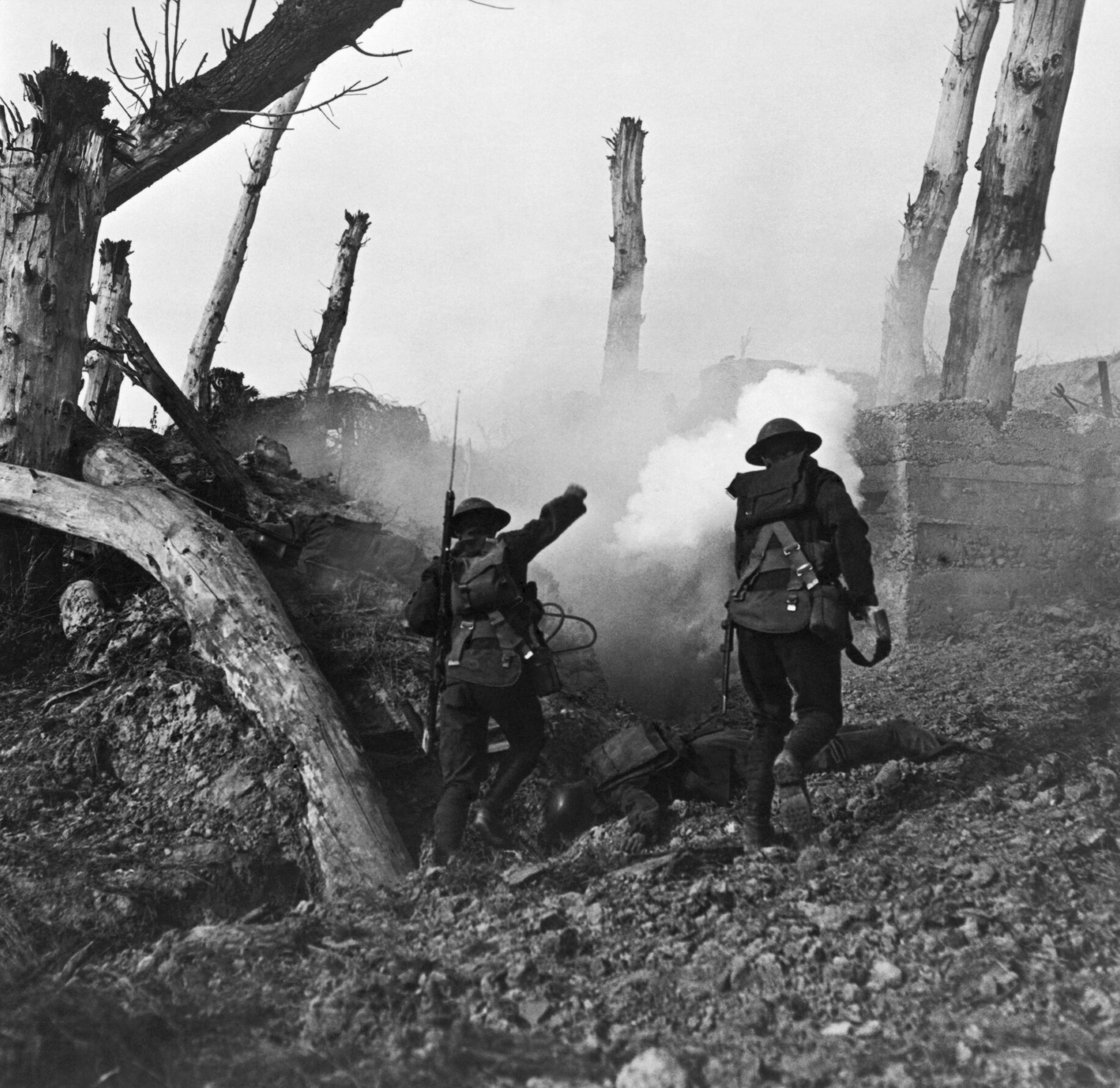The First World War, for Americans and most western Europeans at least, stands out as a bleak and senseless event. The globe’s great powers were drawn into a conflict on a previously unimaginable scale, destroying somewhere around twenty million lives. When the guns of August started firing, many onlookers thought the war would end by Christmas, but instead it lasted four years of trenches and barbed wire, mud and mustard gas. Failure to establish a permanent peace led to an even deadlier conflict twenty years later.
Of course, on April 6, 1917, no soldier could have known the full cost of the war. For Will Schofield (George MacKay), the main character in Sam Mendes’s 1917, such grave thoughts are far from the mind as he rests against a tree behind the reserve trench. He joins his friend Tom Blake (Dean-Charles Chapman), who has been asked to find a partner for an unknown purpose—naïvely, Blake hopes they’ll be sent home for a few days. Instead, they are entrusted with an urgent mission: they must cross no-man’s land and the purportedly abandoned German trenches to deliver a message calling off a nearby attack. (Cable lines connecting the British companies have been cut, so Schofield and Blake must go in person.) To make matters personal, Blake’s older brother is in the other company, and will surely die in the attack should they fail to deliver the orders.
The set-up recalls the final act of Gallipoli, a much less ambiguous war film, which also hinged on the delivery of orders to halt an attack. That movie ends when the messenger arrives to the front lines too late, and Allied soldiers are mowed down in enemy gunfire, portrayed in a stunning final, frozen frame. It is an antiwar message tailored to the First World War: despite all their courage and devotion, the soldiers’ efforts are ultimately meaningless.
1917 seems to tell a familiar story: two soldiers set out on a hopeless mission. When Schofield goes over the top and pierces his palm on the barbed wire, however, we’re right to wonder whether his Christlike wound foreshadows a Christlike sacrifice, and whether there can be redemption for all this great suffering.
A pivotal scene early on suggests that the battlefield is the wrong place to look for redemption and meaning. Blake and Schofield watch two English pilots shoot down a German biplane, which suddenly crash-lands right in front of them, almost killing the two young men. Suddenly, their priorities are reversed—they had been cheering for the death of their enemy, but now that the German pilot is burning to death before their eyes, they struggle to pull him from the cockpit and save his life. When Schofield suggests they put him out of his misery, Blake refuses and insists on giving him a drink of water. Schofield draws water from the well, and offscreen the wounded enemy stabs Blake in the stomach, killing him.
Blake’s death seems to stand in for the hopelessness of the whole affair. Mercy is punished. Bravery brings death. In this world redemption cannot be found.
But that is not the whole story. Moments before the plane came crashing in, Schofield finds a cow standing in the barn. Next to it is a pail of fresh milk; he fills his canteen and drinks a little. Some hours later, after harrowing encounters with German soldiers, Schofield ducks into a sidestreet basement, where he finds a terrified young woman with an infant, not her own, she indicates in French and broken English. The three share a brief, touching respite from the violence outside their fragile bunker. Schofield charms the baby with the prescient nursery rhyme, Edward Lear’s “The Jumblies,” about nonsense figures who “went to sea in a Sieve.” The young woman says the baby needs milk, which happens to be the one thing Schofield has to offer.
Now why should Schofield have a canteen filled with fresh milk? At one point, riding through the ravaged French countryside, he notices that the Germans have indiscriminately shot and killed the grazing cows. But they left the one cow near the barn, and they spared her owner at least long enough to milk her that morning. Perhaps in all the madness of this war, some new life can be nourished, some hope preserved. (After all, despite their misplaced confidence in their makeshift sailing vessel, the Jumblies do not sink, and after twenty years they return from the “Torrible Zone, / And the hills of the Chankly Bore.”)
It is in this small moment, the gift of milk to a hungry infant, that 1917 finds redemption. Yes, war is gruesome—Mendes knows how to create chilling images, not that the battlefields of Flanders and Picardy limited his options. But in the darkest days human courage and mercy are not worthless, and even on April 6, 1917, one can find nourishment and meaning and hope.
Image from Wikipedia
Author Note: Toph Beach is a local film buff who teaches at the Habersham School


